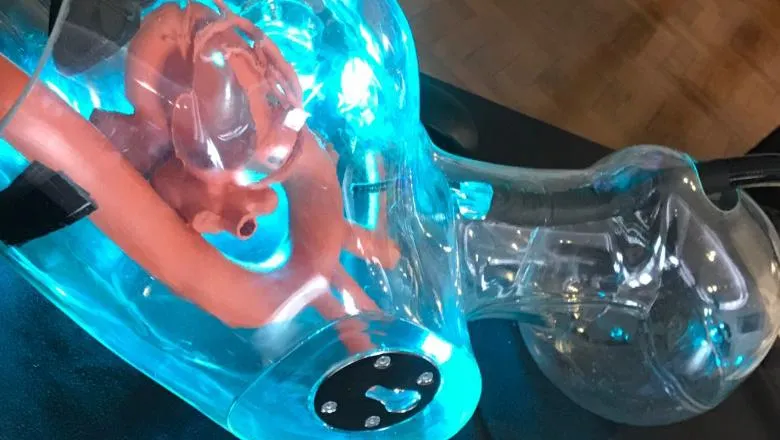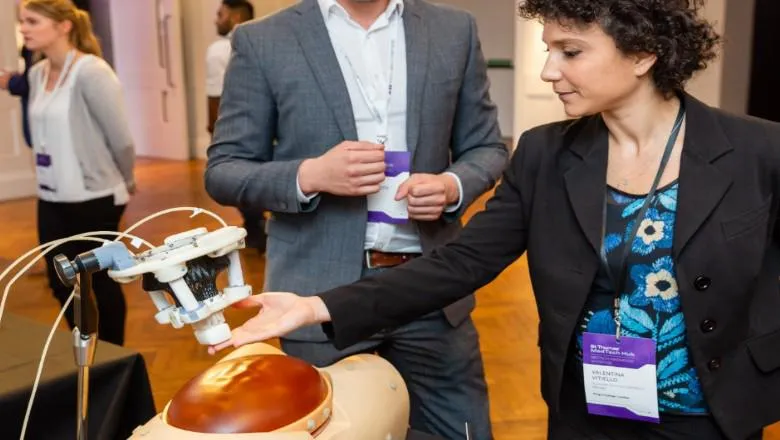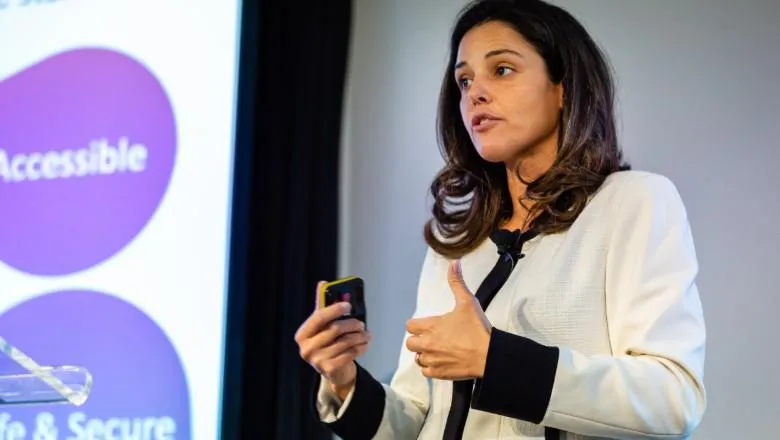Imagine that by simply using a phone, or a tablet, or a computer, an expert surgeon could virtually scrub into any operating room, anywhere in the world; to visually and practically interact in an operation from start to finish.
Dr Nadine Hachach-Haram
13 June 2019
State-of-the-art MedTech innovations showcased during London Tech Week
Tactile surgical robots, state-of-the-art ultrasound technology and 3D printed hearts were on display at a MedTech Innovation Showcase hosted by King’s and Guy’s & St Thomas’ NHS Foundation Trust during London Tech Week.

The event brought together researchers, industry partners and investors to learn about the future of MedTech innovation in London and explore technologies currently in development.
A team from the HaMMeR Lab (Haptic Mechatronics and Medical Robotics) at King’s displayed next generation surgical robots that use tactile touch technology to enhance patient diagnosis and treatment. Their microDART has the potential to remove physical barriers between doctors and patients by using 5G connectivity to connect rural regions with high-quality medical services.

New computer-guided ultrasound technologies were showcased by the iFIND project (intelligent Fetal Imaging and Diagnosis). Their computer-generated ultrasound technologies deliver automated and consistent screening of fetal abnormalities using state-of-the-art ultrasound, MRI, robotics and computing techniques.
Other demos included Big Heart Data, 3D printed hearts that guide diagnosis and predict the impact of medical interventions; Brainminer, which uses Machine Learning – programming computers so they can learn from data – to analyse medical images; and Innersight, a mobile platform that creates 3D models that help surgeons decide on the best surgical plan for their patients.
Entrepreneurs and researchers including Proximie co-founder and Guy’s & St Thomas’ surgeon Dr Nadine Hachach-Haram discussed the latest in healthcare technology at the event. Dr Hachach-Haram described how Proximie’s augmented reality technology helps healthcare professionals connect with each other regardless of geographical location.

Dr Rachel Sparks, Lecturer in Surgical & Interventional Engineering, explained how EpiNav software – pioneered by King’s alongside University College London and the National Hospital for Neurology & Neurosurgery – uses computer algorithms to establish the best treatment plan for patients with epilepsy.
Flexible robot technology for micro-surgery was described by Dr Christos Bergeles who leads the Robotics & Vision in Medicine Lab at King’s. Dr Bergeles highlighted their potential to deliver regenerative therapies deep inside the human body.
The need for frugal health tech innovations was emphasised by Professor Prashant Jha, Head of Affordable Medical Technologies at King’s. He outlined his commitment to creating low cost, high impact healthcare technologies that can transform patient care.
Professor Jha is working with students from a broad range of disciplines to assess individual patient journeys and establish ‘pain points.’ He says, ‘We look at the patient’s clinical journey and map out problems. These problems become opportunities where we can create solutions.’
If people are complaining, there is a challenge. We ask, “can we invent something to solve the challenge in a way that can create a viable commercial product”. These innovations help patients and save money.
Professor Prashant Jha
Learn more about MedTech innovation at King’s and Guy’s and St Thomas’ NHS Foundation Trust.
